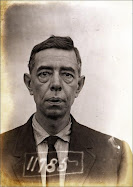One of my favorite stories by Dostoevsky is the often overlooked, early novella titled The Double: A Petersburg Poem. The story is that of a government clerk who goes mad, obsessed by the idea that a fellow clerk (his doppelgänger, facsimile or fetch) has usurped his identity, taken over his life and attempts to destroy the protagonist's good name. It is a schizophrenic, free form nightmare of unending clues and awkward situations. Here is the opening paragraph of The Double: A Petersburg Poem
*

It was a little before eight o’clock in the morning when Yakov Petrovitch Golyadkin, a titular councillor, woke up from a long sleep. He yawned, stretched, and at last opened his eyes completely. For two minutes, however, he lay in his bed without moving, as though he were not yet quite certain whether he were awake or still asleep, whether all that was going on around him were real and actual, or the continuation of his confused dreams. Very soon, however, Mr. Golyadkin’s senses began more clearly and more distinctly to receive their habitual and everyday impressions. The dirty green, smoke-begrimed, dusty walls of his little room, with the mahogany chest of drawers and chairs, the table painted red, the sofa covered with American leather of a reddish colour with little green flowers on it, and the clothes taken off in haste overnight and flung in a crumpled heap on the sofa, looked at him familiarly. At last the damp autumn day, muggy and dirty, peeped into the room through the dingy window pane with such a hostile, sour grimace that Mr. Golyadkin could not possibly doubt that he was not in the land of Nod, but in the city of Petersburg, in his own flat on the fourth storey of a huge block of buildings in Shestilavotchny Street. When he had made this important discovery Mr. Golyadkin nervously closed his eyes, as though regretting his dream and wanting to go back to it for a moment. But a minute later he leapt out of bed at one bound, probably all at once, grasping the idea about which his scattered and wandering thoughts had been revolving. From his bed he ran straight to a little round looking-glass that stood on his chest of drawers. Though the sleepy, short-sighted countenance and rather bald head reflected in the looking-glass were of such an insignificant type that at first sight they would certainly not have attracted particular attention in any one, yet the owner of the countenance was satisfied with all that he saw in the looking-glass. “What a thing it would be,” said Mr. Golyadkin in an undertone, “what a thing it would be if I were not up to the mark today, if something were amiss, if some intrusive pimple had made its appearance, or anything else unpleasant had happened; so far, however, there’s nothing wrong, so far everything’s all right.”

No comments:
Post a Comment